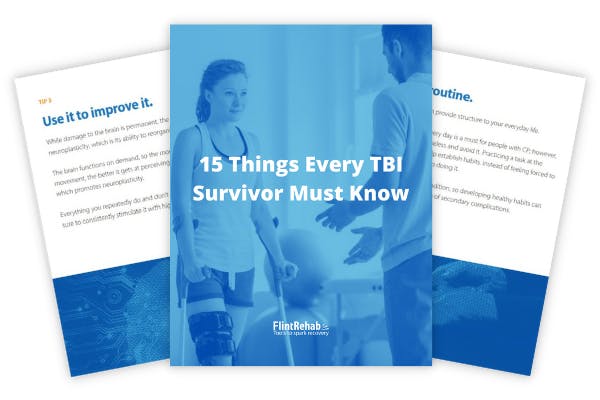No products in the cart.
No products in the cart.
No products in the cart.
No products in the cart.
Home » Neurological Recovery Blog » Traumatic Brain Injury » Memantine for TBI: Possible Benefits and Risks
Written by the editorial team at Flint Rehab
Last updated on April 7, 2020

Can memantine treat the effects of TBI? Is it safe for patients to take memantine for TBI?
While there are fewer studies on the benefits of memantine for TBI than other medications, some of the results are promising. However, most of the benefits only appear during the initial stages of recovery.
To help you make an informed decision, this article will discuss the possible benefits and risks of using memantine for brain injury symptoms.
Memantine, also known as Namenda, is a drug used to treat the effects of Alzheimer’s disease and dementia. It does not cure these disorders, but it can slow progression and improve certain cognitive skills such as memory and awareness.
Memantine belongs to a class of medications called NMDA receptor antagonists. These drugs work by decreasing abnormal activity in the brain. Specifically, memantine blocks the action of glutamate, a chemical linked to symptoms of Alzheimer’s.
Glutamate is a powerful neurotransmitter that excites neurons and helps them send signals between each other. In a healthy brain, it plays a crucial role in learning and memory.
However, too much glutamate in the brain can make the neurons over-excited, which eventually leads to cell death. This process, known as excitotoxicity, is one of the main causes of brain cell deterioration in Alzheimer’s patients.
Excitotoxicity also occurs after a traumatic brain injury.

The initial impact that causes a brain injury is not usually the source of the most severe symptoms.
Rather, TBI causes a cascade of harmful chemical processes in the brain. It’s these secondary injuries that lead to most of the problems associated with brain injury.
One of these harmful processes is an imbalance of glutamate.
Normally, there is a healthy balance between glutamate – which excites nerve cells – and GABA, which inhibits them. This keeps brain cells from burning out.
After a TBI, however, the brain releases more glutamate and less GABA, resulting in excitotoxicity. Researchers believe this is the main source of brain damage after a head injury.
Therefore, if that process could be halted before too many cells die, it could speed up TBI recovery and possibly prevent injuries from getting worse. That is where memantine may help.
Several studies have shown that memantine reduces neuronal damage in patients with moderate traumatic brain injury.
It does this by blocking the activity of glutamate in the brain, thus preventing the neurons from becoming over-excited.
There is also evidence that memantine may help improve outcomes in patients with multiple mild TBIs, though more research is still needed.
Some of the side effects commonly associated with memantine for TBI include:
Memantine can also interact with drugs that are similar to it, such as amantadine or ketamine. Therefore, be careful not to take those at the same time.
Talk to your doctor before starting memantine to make sure none of your other medications will interact.

Memantine appears to have neuroprotective properties and may help prevent some brain injury patients from deteriorating.
However, studies showing positive results have mostly been performed within a few days of a person’s injury. There are currently no studies that demonstrate benefits after this stage.
In other words, while memantine may help prevent a TBI from getting worse, it does not appear to help patients improve their cognitive function later on.
Therefore, if it has already been a few weeks or months since your injury, you are probably better off trying other medications, such as Ritalin.
As always, you and your doctor are the best ones to make this decision. But we hope this article has answered some of your questions surrounding memantine and TBI. Good luck!

If you like our content, you’ll love our ebook and newsletters! Get instant access to our TBI recovery tips ebook with 20 pages of helpful advice by signing up below.
You’ll also receive our emails that share survivor stories and more useful TBI recovery tips, which you can opt out of at any time. (We know you’ll love them, too.)
We will never sell your email address, and we never spam. That we promise.


Time with a speech therapist is extremely valuable during recovery, especially if you struggle with communication, critical thinking, or memory after brain injury. Insurance typically covers speech therapy for a fixed amount of time. But once it’s over, recovery is in your hands.
That’s why a team of neuroscientists and clinicians from Boston University created the CT Speech & Cognitive Therapy app. Designed for those recovering from stroke, TBI, or living with neurological conditions, the app contains over 100,000 cognitive exercises that are all available right from your phone or tablet. That’s like having a speech therapist by your side whenever you want!
This app is the perfect fit if you want to improve your speaking, memory, or general mental sharpness. And, it’s affordable at just $29.99/month!
“For the past 6 months, my son has used the app about three times a week. The app is like a virtual therapist, it’s very easy to use, and it gives him immediate feedback.
He now understands things faster, can make decisions with less hesitation, has improved recognition of words, and his confidence is higher. I also find it easy to get in touch with customer service; they pleasantly help out. The whole experience has been great.”
— Miriam
With the CT App, you can get the guidance you need right from your phone or tablet. You can use it on your own or in between sessions with your speech therapist.
Whether you struggle with aphasia, memory loss, or critical thinking, the CT Speech & Cognitive Therapy App can help.
“The CT app has helped me gather my confidence by building on and reinforcing old forgotten skills. It helps to see my percentages increase, and work harder when they decrease. It’s very self-motivating.” -Kathryn
We are confident that this app will help improve your speech and cognitive function after brain injury. Like our recovery tools, the CT App is also covered by our 30-day money-back guarantee.

Do you know these 15 TBI recovery tips?
Get a free copy of our ebook 15 Things Every TBI Survivor Must Know. Click here to get instant access.
Grab a free rehab exercise ebook!
Sign up to receive a free PDF ebook with recovery exercises for stroke, traumatic brain injury, or spinal cord injury below: